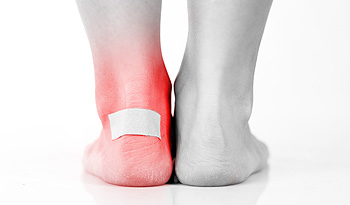
(908) 381-8160Berkeley Heights
 Many people enjoy hiking. Blisters can develop as a result of the miles that are walked on uneven surfaces, and they can be uncomfortable. Excessive friction is a reason blisters can form, which can be caused by wearing shoes and socks that do not fit correctly. A blister is defined as the body’s natural ability to heal damaged skin. A small bubble that is filled with protective fluid forms over the affected area, and will gradually drain as new skin forms. Research has indicated the importance of properly caring for your feet before beginning a hike. These methods can include treating an existing foot fungus, walking barefoot to toughen the skin, and keeping the toenails trimmed. If a blister develops, it can help to protect it with an elastic bandage while hiking is pursued. If you would like additional information about blisters, or if you have a blister that has become infected, please consult with a podiatrist.
Many people enjoy hiking. Blisters can develop as a result of the miles that are walked on uneven surfaces, and they can be uncomfortable. Excessive friction is a reason blisters can form, which can be caused by wearing shoes and socks that do not fit correctly. A blister is defined as the body’s natural ability to heal damaged skin. A small bubble that is filled with protective fluid forms over the affected area, and will gradually drain as new skin forms. Research has indicated the importance of properly caring for your feet before beginning a hike. These methods can include treating an existing foot fungus, walking barefoot to toughen the skin, and keeping the toenails trimmed. If a blister develops, it can help to protect it with an elastic bandage while hiking is pursued. If you would like additional information about blisters, or if you have a blister that has become infected, please consult with a podiatrist.
Blisters are prone to making everyday activities extremely uncomfortable. If your feet are hurting, contact Dr. Janet Leicht of New Jersey. Our doctor can provide the care you need to keep you pain-free and on your feet.
Foot Blisters
Foot blisters develop as a result of constantly wearing tight or ill-fitting footwear. This happens due to the constant rubbing from the shoe, which can often lead to pain.
What Are Foot Blisters?
A foot blister is a small fluid-filled pocket that forms on the upper-most layer of the skin. Blisters are filled with clear fluid and can lead to blood drainage or pus if the area becomes infected.
How Do Blisters Form?
Blisters on the feet are often the result of constant friction of skin and material, usually by shoe rubbing. Walking in sandals, boots, or shoes that don’t fit properly for long periods of time can result in a blister. Having consistent foot moisture and humidity can easily lead to blister formation.
Prevention & Treatment
It is important to properly care for the affected area in order to prevent infection and ease the pain. Do not lance the blister and use a Band-Aid to provide pain relief. Also, be sure to keep your feet dry and wear proper fitting shoes. If you see blood or pus in a blister, seek assistance from a podiatrist.
If you have any questions, please feel free to contact our office located in Berkeley Heights, NJ . We offer the newest diagnostic and treatment technologies for all your foot care needs.